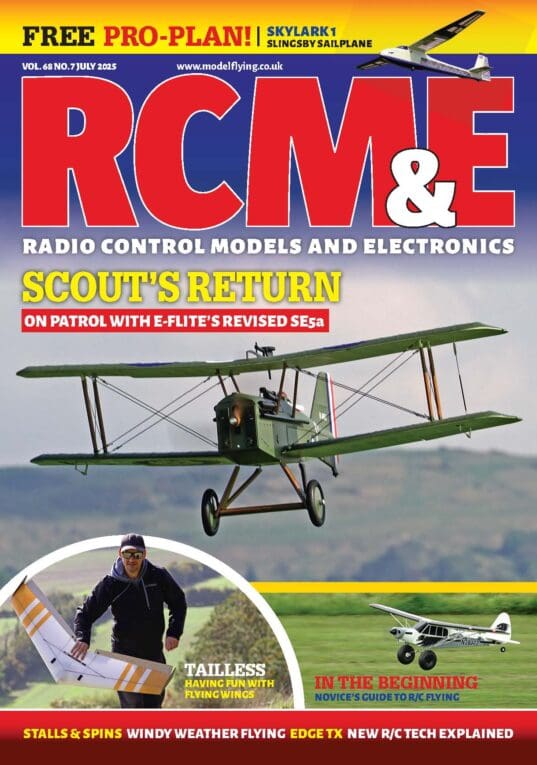Alex Whittaker takes a virtual visit to the centre of The Single Channel Cult
This long, drab, heartless Covid imposition has separated me from my friends over t’ Pennines in Yorkshire. Ah, Yorkshire, where men are men and allus’ buy their own pints. Anyway, my mates from God’s Own County share at least one passion with this here Lancashire Lad. Aye, at Pontefract they keep alight the sacred flame of all things Single Channel.

Enjoy more RCM&E Magazine reading every month.
Click here to subscribe & save.
As you are probably bored of me telling you, I began with a single channel set in the 1970s. To this day I get a kick from the keen recollection of sending my first successful single channel command. My thumb had told my little Keil Kraft Outlaw Mk II to go left and, by golly, her wing gently dipped, she fell on her dihedral, and gently settled into a lovely turn to port. I cannot begin to describe the thrill, satisfaction and sheer joy that simple command movement engendered. Fifty years later it still excites me.

GO EAST OLD MAN
So, every year, we of the Single channel cognoscenti trundle on the M6 over the Pennines to Pontefract. Ah, dear old Ponty, home of liquorice cakes, sturdy chaps in flat caps walking their whippets and, of course, a long-lost Roman bridge. Indeed, you still have to cross a slightly dodgy little wooden bridge to get on to the racecourse. This modern pontus intactus, plus the buzz of the motorway traffic and the precious proximity of the local tip, only serve to add to Ponty’s many charms.

CHECK THE BOOTS
First task when arriving at Ponty is to check all the models being disgorged from the car boots. This part of the Ponty ritual is an absolute delight because every year I seem to spot a kit I have only seen before in ancient magazines.
Single Channel, to refresh your memory, means that the model is controlled by just one control surface. This is usually the rudder, though I have flown a badly set-up ‘aileron only’ S/C model once, but it necessitated a quick change of under garments. (In case you are wondering which fool had set it up so badly, it was me.)

On the very old S/C sets a wind-up rubber-driven escapement drove the control surface. Motor driven servos, like we are used to today, came a bit later. Many of these early S/C sets were ‘bang-bang’ controls, meaning that on the given command the rudder was driven hard over to its furthest travel. A form of early digital: ‘Full Whack, or Nowt’. However, there are later S/C sets that had a normal servo and the travel of the rudder exactly (proportionately!) tracked the amount of rudder applied at the single stick. Thus, the beginnings of the term ‘propo’.

Since they only had rudder control the S/C model was trimmed to climb a bit on full throttle. Naturally, each turn bled off a bit of height, but surprisingly good performance could be extracted from such a S/C model in the right hands. In the early 70s my trusty Outlaw could stay aloft for about eighteen minutes on two ounces of Nitrex .15 coursing through her Enya .09 R/C. I mostly stooged about on mid throttle.

GALLOPING GHOST
Another early radio system was Galloping Ghost, where the control surface was constantly ‘waggling’ about neutral when no command was applied. The inertia of the airframe flying through the air evened out any pronounced airframe waggle and dampened any tendency of the model to ‘porpoise’ in flight. At the appropriate command the waggling surface was then biased toward the intended position and thus a turn (or even up elevator) could be affected. At Pontefract we will normally see all these methods being flown.

ENTER PHIL GREEN
Nowadays, we can fly a number of S/C models at once in the air. This is because we have the huge bonus of Phil Green’s own-designed and revolutionary system to convert classic S/C sets of any of the above type to modern 2.4 Gig operation.

Of course, Phil, and his mate, RCM&E’s own Sean Garrity, are leading lights of the single channel R/C revival in the UK and instigators of this very event. I love chatting to Phil; he is mine of hugely interesting electronical observations. In another life I used to design electronic gear, so I can almost understand him! Naturally, Sean is an old mate, so I will often whiz him on stuff too. He’s older than me so he remembers the days of oiled silk and paper capacitors.


OLD ENGINES
Another great attribute of the Ponty Bash is that you get to see (and hear!) all the old engines you lusted after as a youth but could not afford, or even find in the local model shop. Although I was hardly a diesel man in my youth, over the years I have become more and more fascinated by the sheer breadth of the small diesel gene pool.

Mind you, I feel exactly the same way about the huge range of .049 glow engines that were about, but beyond my ken as a British teenager.

OLD KITS & PLANS
When I was nipper, we never seemed to have enough money for the S/C kits we really liked. So, when I got my first single channel set, I haunted the model shop shelves looking for cheaper free flight models to convert to S/C. Mercury, Veron and Keil Kraft all provided obvious examples and at Ponty one can see many of them duly converted and gliding through the aether.

CLASSIC RADIOS
At Ponty there are always classic radios to see and increasingly many of these highly desirable objects have been converted a la Phil Green’s recipe. Like old models and old engines, radios of that era were distinctive and usually lacked the ‘sameyness’ of many later designs. It must be remembered that in their day, in terms of price, these were premium products, often hand soldered from discrete components and made in modest production runs.

I have long harboured the desire for an OS Pixie. Yup, the famed OS Engines did market single channel radios back on the day, even before the OS Cougar range (they were handled in the UK by Keil Kraft, who often applied their own stickers.)

Ponty often reveals British electronic exotica. I remember watching Richard Atkins’ fine Mercury Matador one year. This classic beauty was controlled by an RCS push button S/C Tx. Richard informed me that, in 1968, this set cost a cool 13 Guineas!

I am a great MacGregor classic radio fancier. But, of course, back in the day they were way beyond my student grant. I loved their blue metal cases and the little thistle logo. At Ponty one often sees classic MacGregor MR 200 Tx’s being flown by discerning pilots.
ELECTRIC CONVERSIONS
In this fallen age, naturally electric conversions of classic plans and kits are all the go. If you want to electrify one of the newly re-released Keil Kraft classics, then you will find a broad range being flown at Ponty.
So, there were classics with ‘leccy motors protruding where their crankshafts used to be. There were even foam versions of classic glows being sported on the front of some electric powered models! Some modellers had made 3D printed plastic versions of old cylinder heads.
I suppose the ultimate was a commercial Junior 40 foam electric ARTF, complete with dummy IC engine. However, despite all this frippery, we have to remember that aeromodelling is broad church, and we must love our weaker brethren… lol.
THE VERDICT
Ponty Single Channel Day is unique. You won’t find a broader range of Single Channel models, engines and radios being flown together. Ponty’s position on the northern motorway network attracts enthusiastic visitors from as far afield as Scotland, Wales and Ireland. It’s a great jamboree and well worth attending.





